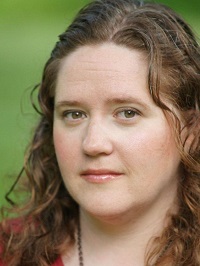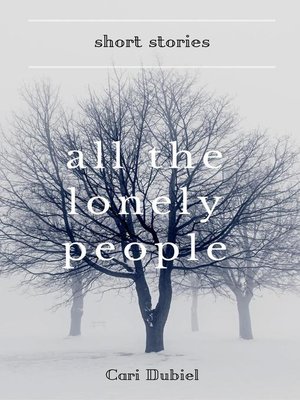Cari Dubiel has been a reader since she was 2-1/2 years old. By the time she was six, she was reading chapter books, and her life as a writer started not long after. When Cari was in 3rd grade, her teacher gave writing journals to the class, and Cari took to it and never looked back. Her confidence as a writer started early as well. While in 5th grade, Cari and her friend got the Writers Market and Guide to Literary Agents out of the library, typed up letters on the typewriter, and queried some agents. They were obviously ready to get published! Needless to say, her professional writing career had to wait a few years, although she frequently filled whole notebooks throughout high school.
Cari was a college English major with a Creative Writing focus and worked with authors like Joyce Dyer and Sarah Willis at Hiram College. Primarily interested in novels in college and winning some awards during that time, Cari would wait 15 years after graduating to find a literary agent. She said that she “really wanted to get published traditionally” and got involved with Sisters in Crime in 2010 and became friends with Casey Daniels, Amanda Flower, and Vivien Chen. Cari tried to write a cozy mystery but found her true passion veered more toward the psychological thriller. That is what led her to her agent, Lynnette Novak of the Seymour Agency.
Even though she is involved in the traditional publishing route currently, Cari said she would like to “end up” as a hybrid author, taking advantage of both traditional and self-publishing platforms. Cari also shared the roller coaster of submitting to publishers. She had one book that was ready to be sent out, and she and her agent identified six publishers and sent them a query sheet, the synopsis, and the draft. Included in her submissions were authors Cari would consider read-alikes for her work: Liane Moriarty, Megan Miranda, and Shari Lapina. Several publishers took it to Acquisitions (which meant it was discussed in the publishers’ meetings as to whether they would purchase the book). However, all six came back with rejections. Cari did say there were some “very nice rejections.” Then came another six publishers (again, some nibbles from Acquisitions). Again, another six rejections. And, finally, another six! The same book to 18 publishers. Cari mentioned that the book she and her agent submitted was a little untraditional with a teen protagonist in an adult story. One publisher told her pointedly, “teen protagonists don’t belong in a psychological thriller.” So noted, Cari thought. The book she is currently shopping around is “a more traditional book,” as Cari described it. “There’s a murder.”
As for Cari’s writing process, she shared that she tries to stick with one project with maybe one in her “back pocket” to “give some space from the manuscript.” Some authors take two days or a week break from one project. Cari said she’s taken as long as six months. She normally tries to produce 2,500 words/week, although with NaNoWriMo (in which she’s participated since 2004), it’s more like 2,500/day until the draft is finished. “I like to draft fast,” Cari said. It takes her about four months to finish at 2,500 words/day. Cari insisted she was definitely not a member of the “5:00 AM Writers Club” but prefers to work at night when her kids are winding down for the day, usually between 8:00 and 10:00 pm. She has also been working with one of her friends who started an MFA Writers Group that meets regularly online.
Cari has also been involved with encouraging aspiring writers since at least 2007 when she and a fellow staff member, Beth Hatch (currently director of the Upper Arlington Public Library), started a writers group at Twinsburg Public Library. Now hosted by other staff at the Twinsburg Public Library, The Writers’ Group continues to meet on the first Tuesday of each month over Zoom. Cari and Beth also had a podcast that ran regularly from 2007 through 2019: ABC Book Reviews Podcast (A Beth & Cari Book Reviews Podcast). Cari also discussed her library’s use of BiblioBoard and The Indie Author Project to help promote their writers’ work. The platform allows authors to submit their work to allow people to access it, and Library Journal chooses one book to share on Overdrive and BiblioBoard each year. Cari submitted her book All the Lonely People in this way, and the library group has published two anthologies via BiblioBoard.
So, Cari has taken many routes to getting her work out into the public sphere. In discussing the changing perceptions of self-publishing, Cari said there’s still a stigma associated with it “inside library world, but not so much outside.” There is “lots of good stuff,” she said, “and I can just publish things I want to publish” by self-publishing. For example, she likes to write sci-fi which may not fit for her agency; however, they are “very supportive of hybrid authors.” Her sci-fi book, Off Switch, was published under the name C.T. Baker (“the name I was born with”) was published this way.
Cari brought up outlining when asked what she finds difficult about writing. “I’m not a pantser.” She likes organization and structure; however, keeping to the outline once she starts writing can present issues. When she begins to write, she might “stumble into something weird” and start deviating from the draft. “I might end up in a place I didn’t expect.” Although, she did say she has “stumbled into a better ending” for stories as well. Using the structure, though, allows Cari to hit benchmarks even if she does take some detours. Cari mentioned writing dialogue can also be a challenge sometimes, and she would like to write more “lyrically.”
When asked what she likes best about writing, Cari said she is very plot driven. “I love characters, but plot drives me to read.” The books – and writing – she likes best is when there’s a “symbiotic relationship” between plot and character, especially “when character arcs are connected to the plot. That feels satisfying.” So, she aims to satisfy herself when writing but also keeps her audience in mind. “It’s important to have an audience that you’re writing towards.” Cari described her writing as “more emotional.” She insisted that you’re not going to get a “Tom Clancy spy thriller” when reading her work.
When asked for any advice for the aspiring writer, Cari mentioned, “You just have to write! Don’t get caught up in the idea of publishing right away. Some people will write one short story and ask how they can get it published. You have to hone your craft.” Just as importantly, Cari stressed the need for feedback from “beta readers.” She also said that if you’re going to self-publish, you really have to have a marketing plan! No one is going to know about your book unless you have a marketing plan. “You’ve got to be intentional and make sure the work is solid first. Then focus on the other stuff.”
Cari’s Recommended Reading and Organizations for Aspiring Writers
Save the Cat! Writes a Novel: The Last Book On Novel Writing You’ll Ever Need by Jessica Brody
K.M. Weiland‘s series of books including:
- Outlining Your Novel
- Structuring Your Novel
- Creating Character Arcs
- Northeast Ohio Sisters in Crime (NEOSinC)
- Mystery Writers of America Midwest Chapter
- Society of Children’s Book Writers and Illustrators (Ohio: North)
- Great Lakes Fiction Writers
- Cuyahoga County Public Library Skirball Writers’ Center
Cari’s was also kind enough to share her PowerPoint presentation entitled All Aboard! How to Make Sure Your NaNo Project Doesn’t Derail. Download her Powerpoint Presentation (PDF).



